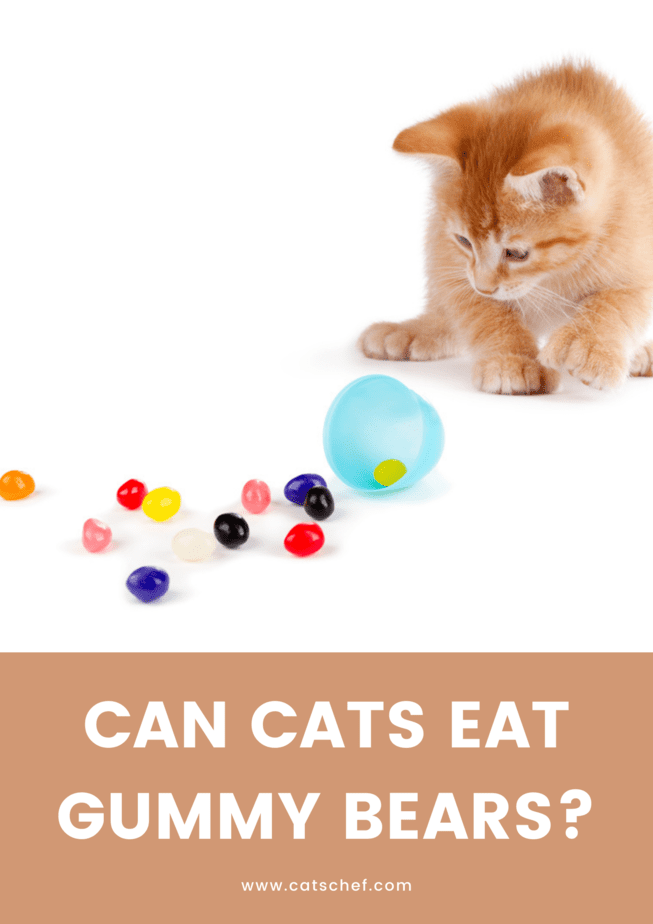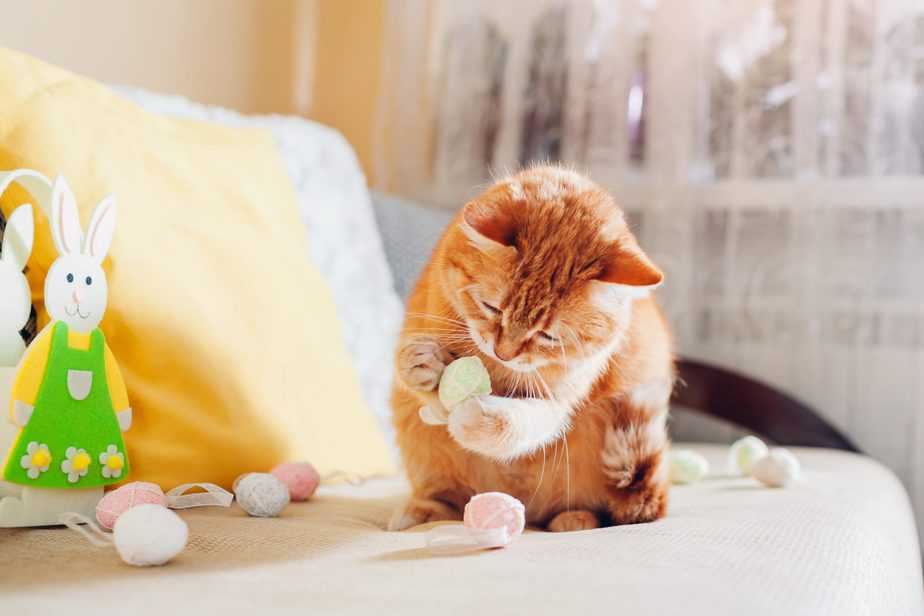Candy is an awesome part of life, that I’m sure we can all agree on. Felines have their treats, but have you ever wondered can cats eat gummy bears?
For example, you had a kids’ birthday party earlier on and a mess is inevitable. You see your cat hiding in the corner and she’s celebrating as well. However, she isn’t celebrating the birthday, but rather what seems to be a small victory.
You see her fumbling with something in between her paws and before you can shout “leave it,” it goes straight down her throat. Now, you wonder what to do next – to go into crazy panic mode or to continue with the party.
You’re safe for now and can keep the party rolling. But just because your cat isn’t showing any side effects now, it doesn’t mean she’s out of the woods.
Are gummy bears dangerous to cats?
These funny-shaped candies can potentially be dangerous to felines. They are not poisonous, which is good news.
Still, they are a choking hazard and can easily ruin your party. Besides this obvious reason, gummy bears are almost entirely made of sugar.
These candies don’t meet a feline’s dietary requirements and are, therefore, unnecessary to consume. Cats have been humans’ life companions for so long. Thankfully, this resulted in various cat treats and generally, a variety of options for cats that you can replace gummy bears with.
Gummy bears are a choking hazard
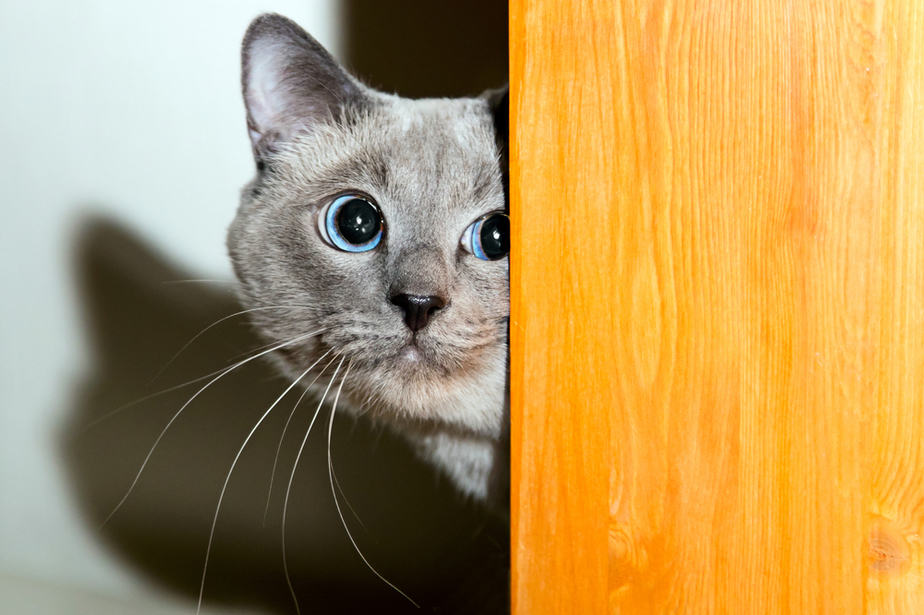
Because of their gum-like texture, gummy bears are not recommended for small children. Due to cats’ size, this same rule can also be applied to them.
Just as their name states, they are pretty gummy and can be hard to chew. Especially if your cat has never eaten these before and she gobbles down one whole gummy bear.
Because of their gummy texture, they can get stuck in your feline’s throat, which can lead to choking. Besides, your cat can start panicking, which is an even worse case scenario.
Another scene would be your cat getting it stuck between her sharp teeth. I remember that as kids, we would always “stick” these candies on our canines. No idea why, but it was just something we did.
While cats won’t do that intentionally, it can easily happen. Your cat will probably let you know about this problem by trashing your apartment trying to get them to come off.
If she somehow manages to swallow it whole without chewing it, it can also cause intestine blockage. Felines aren’t wired to digest these foods and while having a hard time doing so, gummy bears can cause serious problems.
Candies are made of sugar
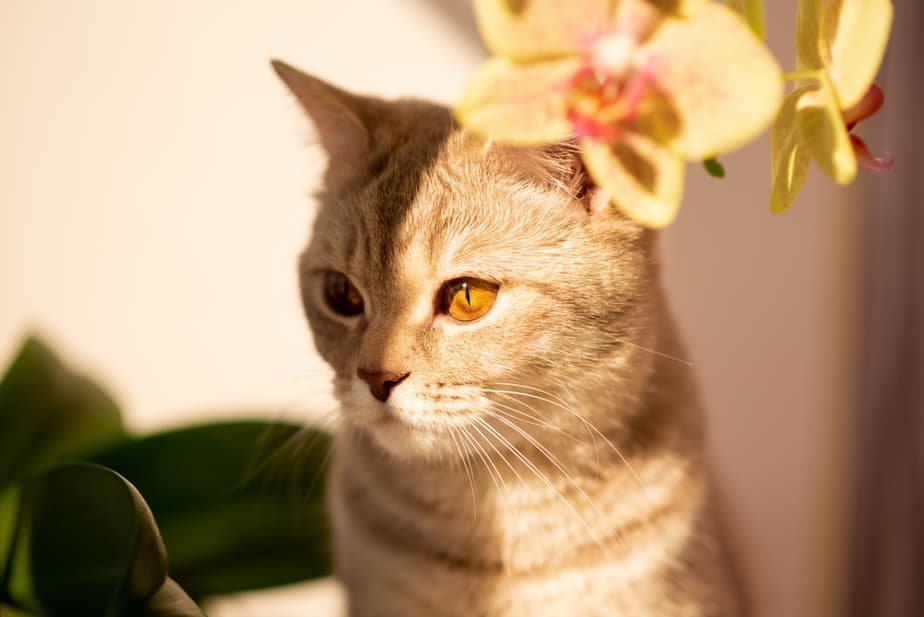
As we all know, candies are packed with sugar. This is the reason we eat them, right? When you crave something sweet, there are no words to describe your joy when finding a bag of these.
However, cats will disagree with us. They can’t pick up this sweetness because they lack the taste buds for it. So, your cat will never eat them on her own because she likes the sweet taste.
Sugar is a carbohydrate and these nutrients aren’t required in a cat’s diet. They can’t benefit felines in any way and can only cause health problems.
If felines consume sugar regularly, this can badly reflect in their dental health, causing tooth decay. Apart from that, cats can gain weight from eating carbs, which in turn puts pressure on their joints. An underlying disease, diabetes, can develop from carbs intake in the long run.
Besides regular sugar, corn syrup is also used as a sweetener in gummy bears. This isn’t healthy for humans, especially for cats as it can increase the risk of heart disease. This means cats can eat gummy bears, but there’s no guarantee for zero consequences.
We established they don’t crave sugar, so what is it that cats like in gummy bears? Well, these candies are made of gelatin as well.
Gelatin content in gummy bears
This is what’s probably tickling your cat’s whiskers. Felines will give it a try because of the animal-derived gelatin that’s found in gummy bears.
On its own, gelatin is safe for cats to eat and can be quite beneficial. This colorless and flavorless ingredient serves as a gelling agent in many foods, beverages, and medications. Due to its animal origins, gelatin contains certain amounts of protein that can benefit your feline.
Can cats eat gummy bears: Are there any health benefits?
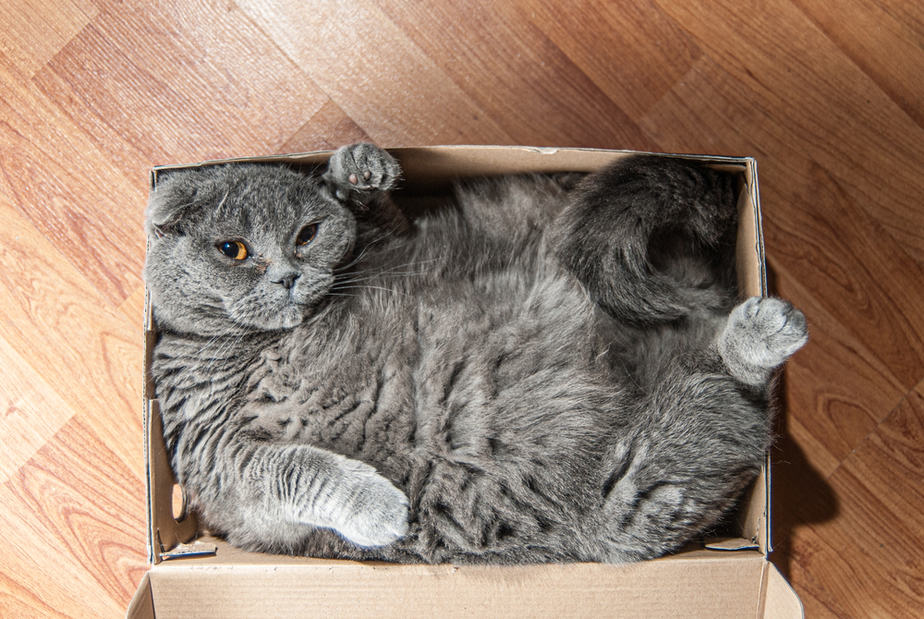
Apart from small amounts of protein contained in gummy bears, there’s nothing beneficial to cats. Even the protein isn’t enough to make these candies a staple in a feline’s diet.
Sugar and sweets are unnatural to a cat’s diet and she will have a hard time digesting them. Apart from the above-mentioned carbohydrates, gummy bears are loaded with calories.
Cats need calories to produce energy, but large quantities can build up in their bodies. These excess calories are then stored as fat that can cause many health issues such as obesity, diabetes, increased risk of heart disease, joint pain, etc.
Besides, gummy bears are high in sodium as well. While small amounts are required to keep a feline’s body healthy, any excessive salt can result in sodium poisoning.
This condition can be recognized through some common symptoms such as vomiting, diarrhea, as well as excessive thirst and urination. Some severe cases of salt poisoning result in seizures, tremors, and coma.
So, it’s safe to say that cats can but shouldn’t eat gummy bears, as there are no health benefits to it. Moreover, felines can experience gastrointestinal distress because they have a hard time breaking down the ingredients found in these candies. Signs of a stomach upset include bloating, gas, abdominal pain, diarrhea, and vomiting.
Can cats eat fruit gummies?
Where is the difference between gummy bears and fruit gummies? There’s not much difference honestly, the most obvious one is their shapes.
Fruit gummies are also made of lots of sugar and gelatin. They contain small amounts of fat, which you’d think would be good for felines. However, the type of fat found in these commercial foods is saturated, unhealthy fat.
These can raise your cat’s levels of cholesterol, which can lead to higher risks of certain diseases, such as stroke. Therefore, what stands for gummy bears and felines’ relationship with them, the same goes for fruit gummies.
What about jelly?
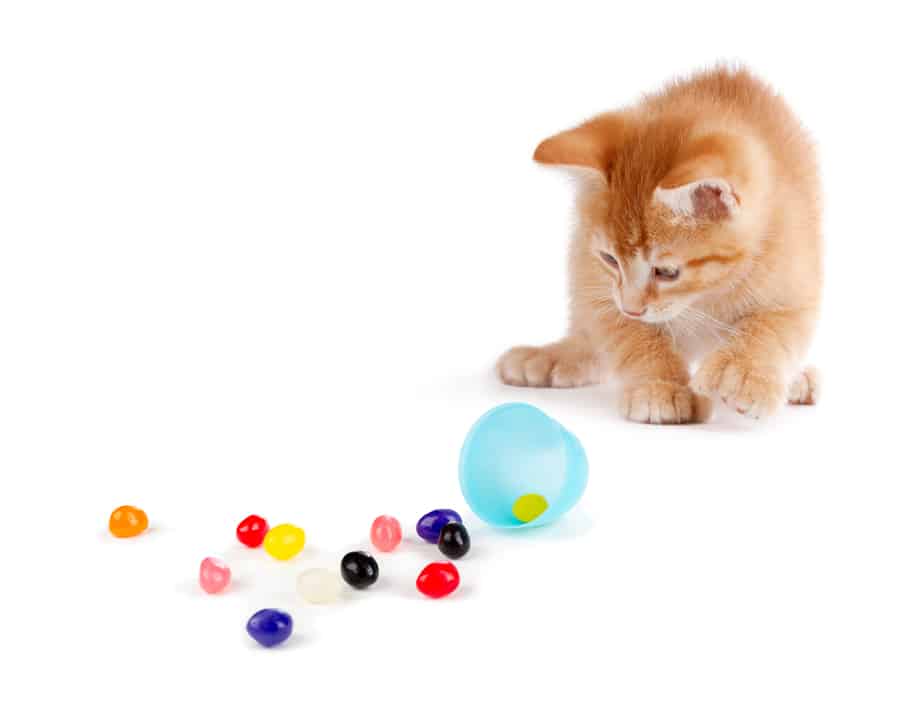
This is another food with a high gelatin content. The ingredients are similar to those of gummy bears and fruit gummies, which means it’s not the healthiest choice for felines.
Cats can eat some jelly without consequences, but refrain from feeding your pet this food. It isn’t cat-appropriate and your feline may exhibit some signs of an upset stomach.
Are jelly candies safe for cats?
You should refrain from feeding your furry friend any jelly candies. For instance, sour jelly is a big no-no because of the sour sanding or sour sugar. The reason behind this is that citric or tartaric acid is used to make this component.
Your cat will not enjoy the taste, and it may also be harmful to her. Citric and tartaric acids are too strong for a feline’s stomach.
You may believe that a jar of sour jelly will tempt her and her taste buds. However, you are mistaken on that point. Instead of sour jelly, consider giving her some cat-appropriate snacks.
Can cats eat sugar-free gummy bears?
Sugar shouldn’t be eaten by cats, as we’ve already established. However, the name may be deceptive. Just because something is sugar-free doesn’t mean it’s good for your pet.
When avoiding sugar, it’s common to come across other sweeteners that could be harmful to your cat. Don’t be gullible when it comes to these marketing gimmicks.
Artificial sweeteners: a reason for concern
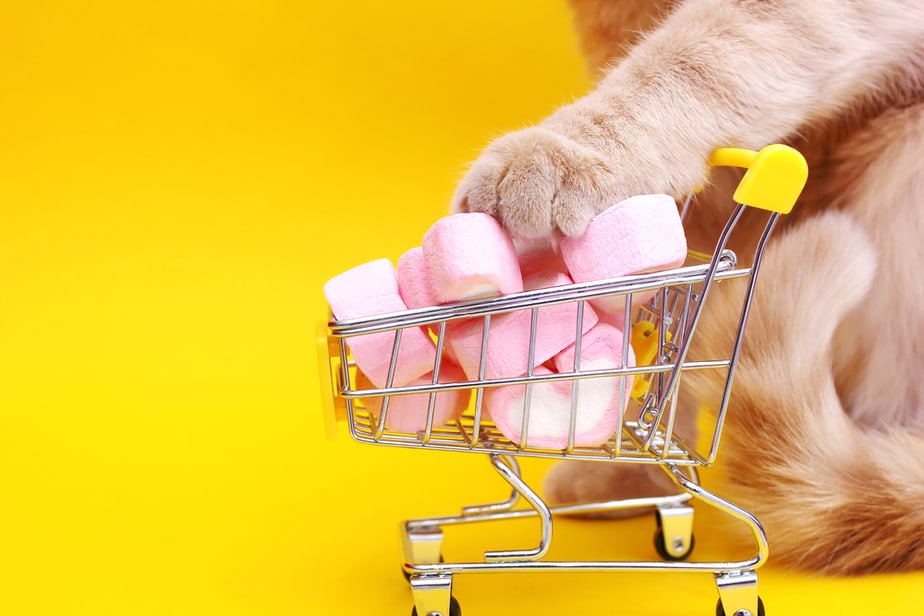
The name speaks for itself. When something is artificial, it is unnatural and, in most cases, not healthy. Artificial sweeteners are widely used nowadays, especially in candies.
Companies nowadays use artificial sweeteners as they are cheaper than extracting natural juices. These can cause potential harm to felines as the compounds used in them can upset their stomachs.
Unfortunately for cats, there are some poisonous sweeteners out there. For example, xylitol, which can be found in gummy bears, is highly toxic to felines.
The interaction of xylitol with your pet’s digestive system poses a risk. It swiftly absorbs into your pet’s bloodstream and prompts the release of insulin from their pancreas. Hypoglycemia, or low blood sugar, is the effect of this. If left untreated, this can lead to death.
Feeding gummy bears to cats is a bad habit
I hate to be a downer, but it’s our responsibility as pet owners to teach our cats healthy habits, or we will pay the price. Needless to mention this price will usually come from your vet.
If your cat becomes accustomed to the taste of gummy bears, she will begin to pester you for more in the future. This way, you’re developing bad dietary habits in your cat.
The greatest thing you can do is acclimate your cat to the sound and taste of cat treats designed exclusively for felines. If you’re more for a homemade cat treat recipe, some dried anchovies will make your life easier.
Can kittens eat gummy bears?
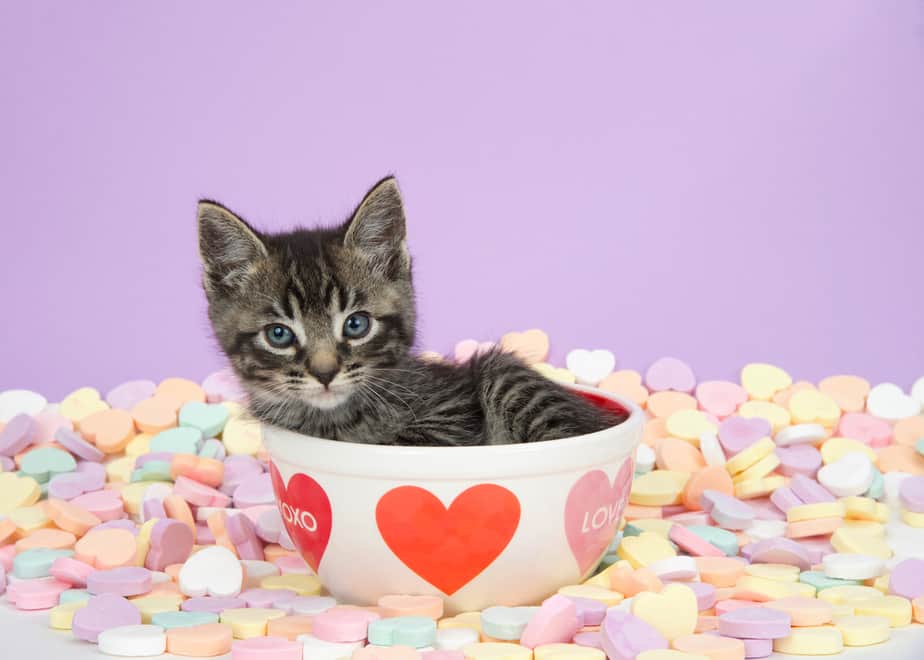
As these candies are unhealthy for a grown cat, they will be even unhealthier for smaller fluffs. Kittens shouldn’t eat any foods that aren’t specially made for them.
They need a balanced and healthy diet to grow strong and for their bones to develop healthily. Your kitten’s diet will affect her greatly in the future. Gummy bears are not something your kitten will thrive off of.
Kittens are smaller in size than adults and the chances of gummy bears getting stuck in their small throats are higher. Besides, they can’t digest foods as easily as adult cats because their bodies still haven’t developed thoroughly.
Starting these bad habits from an early age will only make matters worse. Your kitten may learn that candies are a constant in their diet and end up refusing their regular cat food. High sugar content foods such as gummy bears are just setting your kitty up for diseases such as diabetes in the future.
Can cats eat gum?
No, cats cannot eat gum; it can cause severe damage to their health. Gums contain xylitol, which is an artificial sweetener that’s highly poisonous to felines. Xylitol raises your cat’s insulin level that rapidly lowers sugar levels, which leads to a dangerous condition called hypoglycemia.
This condition is known to cause lethargy, weakness, and seizures. Cats eating gum can contribute to other health-related problems. Swallowed gum can cause obstructions and blockages in felines.
Remember how as kids we were told not to swallow gum? It’s not because it will stick to our intestines, but because it’s not digestible. The same goes for cats as well, as the gum can get stuck in her digestive tract.
If your cat can’t get rid of the gum on her own, she will probably have to undergo surgery. Dehydration, vomiting, loss of appetite, and constipation are all signs of intestinal blockage.
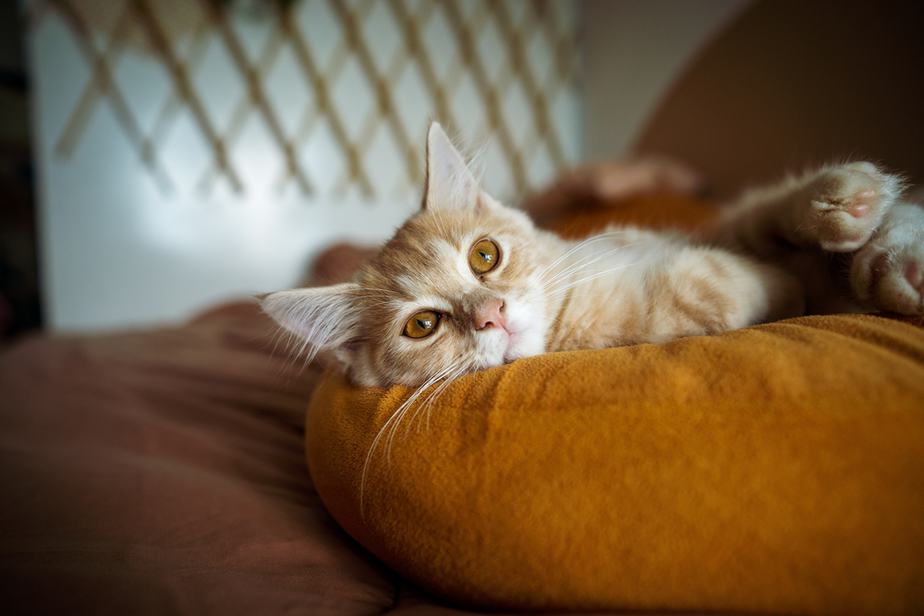
Can cats eat gummy bears in moderate quantities?
If possible, don’t ever feed gummy bears to cats. They are not usually poisonous, but some candies might have toxic compounds such as xylitol. Artificial sweeteners and flavors can cause gastric distress in felines so you better stay away from these sugary treats.
Final thoughts
The high sugar content in gummy bears can cause short-term and long-term health problems in cats. For example, felines are prone to developing tooth decay if consuming too much sugar.
More severe conditions include obesity, which causes joint pressure that can furthermore be a foundation for many joint diseases, such as osteoarthritis. Cats may even develop chronic diseases such as diabetes, just like humans.
If your cat got her paws on a gummy bear, monitor her behavior the next few hours. Check for any signs of gastrointestinal distress and make sure she chewed and swallowed it properly. Watch out for any gags or unusual behavior that could signal your cat is choking.
Keep the candies hidden in your pantry and don’t encourage your pet to eat them. There are quality cat treats found in pet shops and so many cat-safe recipes you can make by yourself.
If your feline has eaten a few gummy bears and you see she isn’t feeling well, take her to the vet as soon as possible. It could be xylitol poisoning or the gummy bear could be stuck in her intestines.
Worst-case scenarios don’t just happen in your thoughts. Unfortunately, they can also happen in real life and it’s up to you to try and prevent these. Err on the safe side and keep any sweet treats far away from your four-legged companion.
You used to wonder can cats eat gummy bears and now you have all of the answers you needed.
Read more: Can Cats Eat Licorice? All You Need To Know
